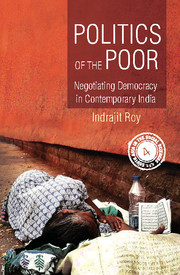Book contents
- Frontmatter
- Contents
- List of Tables, Map and Charts
- Acknowledgements
- Glossary
- Acronyms
- Introduction: Against False Binaries
- 1 The Perspectives of the Study: Towards an Agonistics of Democracy
- 2 Political Spaces: Institutional Opportunity Structures
- 3 Political Spaces: Social Relations of Power
- 4 From Clientelism to Citizenship?: The Politics of Supplications
- 5 From Moral Vocabularies to Languages of Stateness?: The Politics of Demands
- 6 From Backwardness to Improvement?: The Politics of Disputation
- 7 From Tradition to Modernity?: The Politics of Imagination
- Conclusion: The Politics of the Poor: Agonistic Negotiations with Democracy
- Annexure 1 The Dramatis Personae, 2009–10
- Annexure 2 The Census Survey
- Annexure 3 The Multidimensional Poverty Index
- Annexure 4 Schedule for BPL Census 2002
- Annexure 5 Schedule for BPL Census 2002 West Bengal
- Annexure 6 BPL Cutoff List for West Bengal
- Bibliography
- Index
2 - Political Spaces: Institutional Opportunity Structures
Published online by Cambridge University Press: 03 August 2019
- Frontmatter
- Contents
- List of Tables, Map and Charts
- Acknowledgements
- Glossary
- Acronyms
- Introduction: Against False Binaries
- 1 The Perspectives of the Study: Towards an Agonistics of Democracy
- 2 Political Spaces: Institutional Opportunity Structures
- 3 Political Spaces: Social Relations of Power
- 4 From Clientelism to Citizenship?: The Politics of Supplications
- 5 From Moral Vocabularies to Languages of Stateness?: The Politics of Demands
- 6 From Backwardness to Improvement?: The Politics of Disputation
- 7 From Tradition to Modernity?: The Politics of Imagination
- Conclusion: The Politics of the Poor: Agonistic Negotiations with Democracy
- Annexure 1 The Dramatis Personae, 2009–10
- Annexure 2 The Census Survey
- Annexure 3 The Multidimensional Poverty Index
- Annexure 4 Schedule for BPL Census 2002
- Annexure 5 Schedule for BPL Census 2002 West Bengal
- Annexure 6 BPL Cutoff List for West Bengal
- Bibliography
- Index
Summary
The first task of the Assembly is to free India through a new constitution, to feed the starving people, and to clothe the naked masses, and to give every Indian the fullest opportunity to develop himself according to his capacity.
Jawaharlal Nehru, 1947Political democracy cannot last unless there lies at the base of it social democracy.
Bhimrao Ambedkar, 1950While being the world's largest electoral democracy, India contains more people in poverty than any other country in the world. Moreover, poor people – oppressed though they are – are central to India's democracy. Political parties routinely seek legitimation from them, and governments are wary of being perceived as antagonistic to their interests. This chapter synthesizes key literatures to present the opportunity structures that inhere in India's democratic institutions and which impinge upon the politics of the poor. I will first highlight three general features that India shares with other postcolonial democracies before I unpack its formal, participatory and social components (Huber and Stephens, 1996). In this context, I highlight the country's majoritarian electoral system as well as the privileging of civil and electoral rights over social and economic rights that is hard-wired into the formal component of Indian democracy. I follow up this discussion with an examination of the participatory aspect of India's democracy, through which I call attention to the advances and limits of electoral participation among India's poor. I finally discuss the social component of democracy to remind readers of the widening inequalities in India and the concentration of poverty among members of certain historically oppressed communities. A discussion of these three dimensions persuades us to appreciate contemporary India's unequal democracy.
If an overview of the formal, participatory and social dimensions of India's postcolonial democracy offers general insights into the opportunity structures available to the country's population, a consideration of the economic geography and social history of eastern India, where this study is based, helps to specify them: this is the purpose of the second section. While doing this, I signpost two points. One, I emphasize the salience of manual labour to the region's paddy-based agrarian economy. Access to manual labour is mediated through the social category of caste, making it central to any analysis of social relations in the region.
- Type
- Chapter
- Information
- Politics of the PoorNegotiating Democracy in Contemporary India, pp. 60 - 116Publisher: Cambridge University PressPrint publication year: 2017



